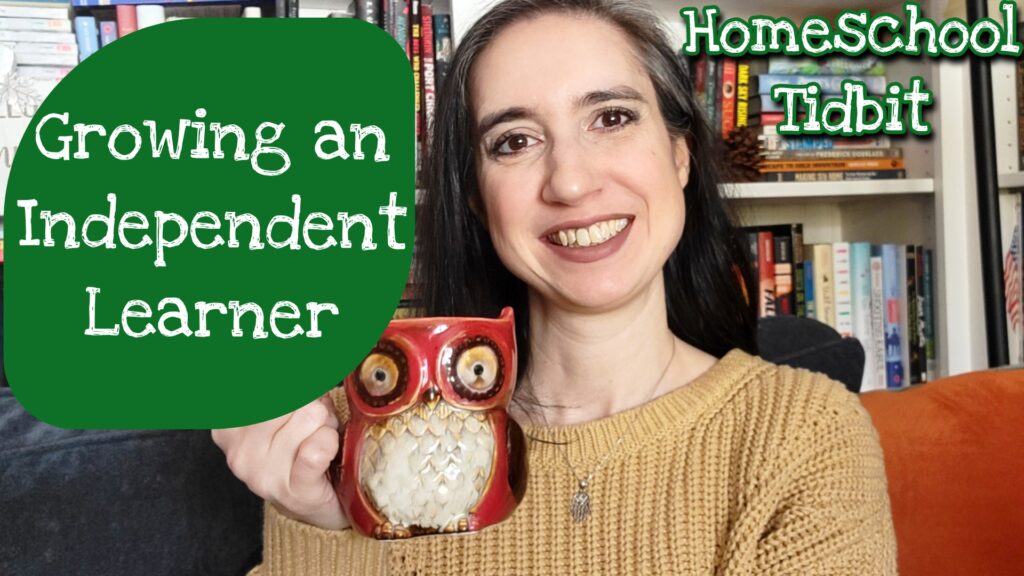Homeschool Tidbits: Tips for Building Independence
March 17, 2023

Welcome to Build Your Library’s Homeschool Tidbits: Episode 46 – Tips for Building Independence. In this weekly video series, I will delve briefly into a topic related to homeschooling and will share some of my knowledge and expertise as a long-time homeschooling mother of 4 children. Three of whom have graduated high school and one who is a college graduate!
As a homeschool parent, it is no surprise that teaching your children takes up a large part of your day. You are right there with them all day long as they work through their lessons. Homeschooling is an important and worthy way to spend your time. When we decide to homeschool, we aren’t picturing handing our child a stack of books and sending them on their way. We know what we’re getting into. You read to them, guide them, and answer their many questions. But with so much of your day devoted to homeschooling, you may find yourself struggling to fit in other tasks. Laundry, cooking, cleaning, or going to the bathroom alone, who has the time?
This is why it is important to begin fostering independence from the beginning.
Your child likely won’t be fully independent until they are teens. But that doesn’t mean that you need to be chained to the kitchen table beside them the entire day until then. You can absolutely start working with them towards building some independence in the elementary years. Today I’m going to share a few tips to help you encourage independence in their education.
Have a Plan
You probably already have a planner to keep track of daily lessons. All you need to do is modify that idea and write out a simple list of what will be expected of your child each day. You can do this in a notebook or you can write a simple list on a white board. This will give your child an expectation of what their day will look like. As they complete an assignment, they can check it off the list. In the beginning, you’ll still be working with them side by side. But as they get older, you can let them choose what assignment to do next, and even plan some things on the list that they can do on their own.
Eventually, an older child can make their own list of assignments that they need to tackle each day. By you modeling for them what planning looks like, they will be equipped to tackle it on their own when they reach high school age.
Independent Reading
Once your child has mastered reading skills and is able to read fluently, you can assign independent reading time into their day. Start small and plan for them to read for 15 – 20 minutes on their own. As they get older, the time grows to at least 30 – 45 minutes. This is usually the first thing they are able to do totally on their own.
I also allow them to choose their own reading material. We alternate between books I choose for them to read and books they choose on their own. Sure, sometimes a book they pick will be an easier read, but if they are excited enough to choose it and then read it on their own, I’m totally OK with that. We all deserve some fun and easy fluff once in a while!
Choose curriculum that they can do independently
Some homeschool parents scoff at workbooks, but they can be a great way to foster independence! Especially if you are Charlotte Mason inspired or something similar. You spend a lot of the day reading together, so having a workbook that they can do on their own can be a life saver. There are many quality workbook options. From math to spelling to map skills you can give them worthwhile assignments and even manage a 5 – 10 minute break for yourself to grab another cup of coffee or go to the bathroom. Some of my favorite workbooks are the Explode the Code series for phonics, and Evan Moor for pretty much everything else. The Critical Thinking Company makes some great workbooks as well.
In the middle school and high school years, you could even have them take a few outside classes, either online or in your community. Especially for always homeschooled kids, this is a great way to build independence. They have to work with another teacher and be in charge of any assigned work. When my twins were teens, they took art and music classes at the local high school and we’ve always fit in at least one or two online courses a year for things like foreign language and science.
Involve them in Decision Making
When your children are around 6-7 years old, they are capable of discussing their interests with you and may be ready to have some input in their learning. I’m not saying you need to be completely child-led in your homeschool, but giving an 8 year old a choice in subjects like history and science can go a long way towards fostering independence. It is also great at showing them that their interests are important and worthwhile.
If you are concerned about giving them that much freedom, you can offer choices. Would you rather study US History or Ancient History? Would you like to learn about trees or the human body? Then commit to studying what they choose!
Keep them Accountable
If you are going to assign independent work, then you need to make sure they are keeping up with it. Set up a time each day or week to check in and go over their work with them. It’s easy to assign work: complete this workbook page or read these chapters. But you have to then follow up and ensure they actually did the reading or completed the assignment correctly.
In the elementary years, I check in 30 minutes to a hour after the work was meant to be done. This ensures that they know I’m going to be checking in soon. If you have a dawdler, you can set a timer so they know that they have a certain amount of time to complete the work.
With older kids and teens, I like to do a weekly meeting where we go over our goals for the week and look over their planner together. Then throughout the week I will check in and go over assignments, talk about their readings and such.
Building independent learners is a long game. The earlier you begin, the easier it will be when you transition to homeschooling tweens and teens. A child who is used to taking on their school work independently and knows how to stay on task is a young adult who will do well in college and beyond.
Coming up next…
I hope you found this Tidbit helpful! Come back next week for more homeschooling inspiration!
Until then, happy reading!
See Other Related Articles:
- Happy, Hygge Homeschooling?
- “Are worms made out of metal?” And other great rabbit trails.
- Charlotte Mason in the Secular Homeschool
- A Literary Education book
- About Build Your Library
- Homeschool Tidbits: Build Your Library’s Weekly Video Blog Series
.
 Emily Cook is the author and creator of the secular homeschool curriculum Build Your Library, a literature-based K-12 program infused with the teachings of Charlotte Mason. She writes full-year lesson plans as well as shorter topical unit studies. Emily has been homeschooling her four children in Southern NH for 21 years. She is passionate about reading aloud to children of all ages and loves to share her love of literature with others. She and her family also make incredibly dorky videos about homeschooling, books, and more on Youtube at ARRRGH! Schooling. You can follow her on Facebook, Twitter, and Pinterest. You can also check out her author page on Amazon.
Emily Cook is the author and creator of the secular homeschool curriculum Build Your Library, a literature-based K-12 program infused with the teachings of Charlotte Mason. She writes full-year lesson plans as well as shorter topical unit studies. Emily has been homeschooling her four children in Southern NH for 21 years. She is passionate about reading aloud to children of all ages and loves to share her love of literature with others. She and her family also make incredibly dorky videos about homeschooling, books, and more on Youtube at ARRRGH! Schooling. You can follow her on Facebook, Twitter, and Pinterest. You can also check out her author page on Amazon.
